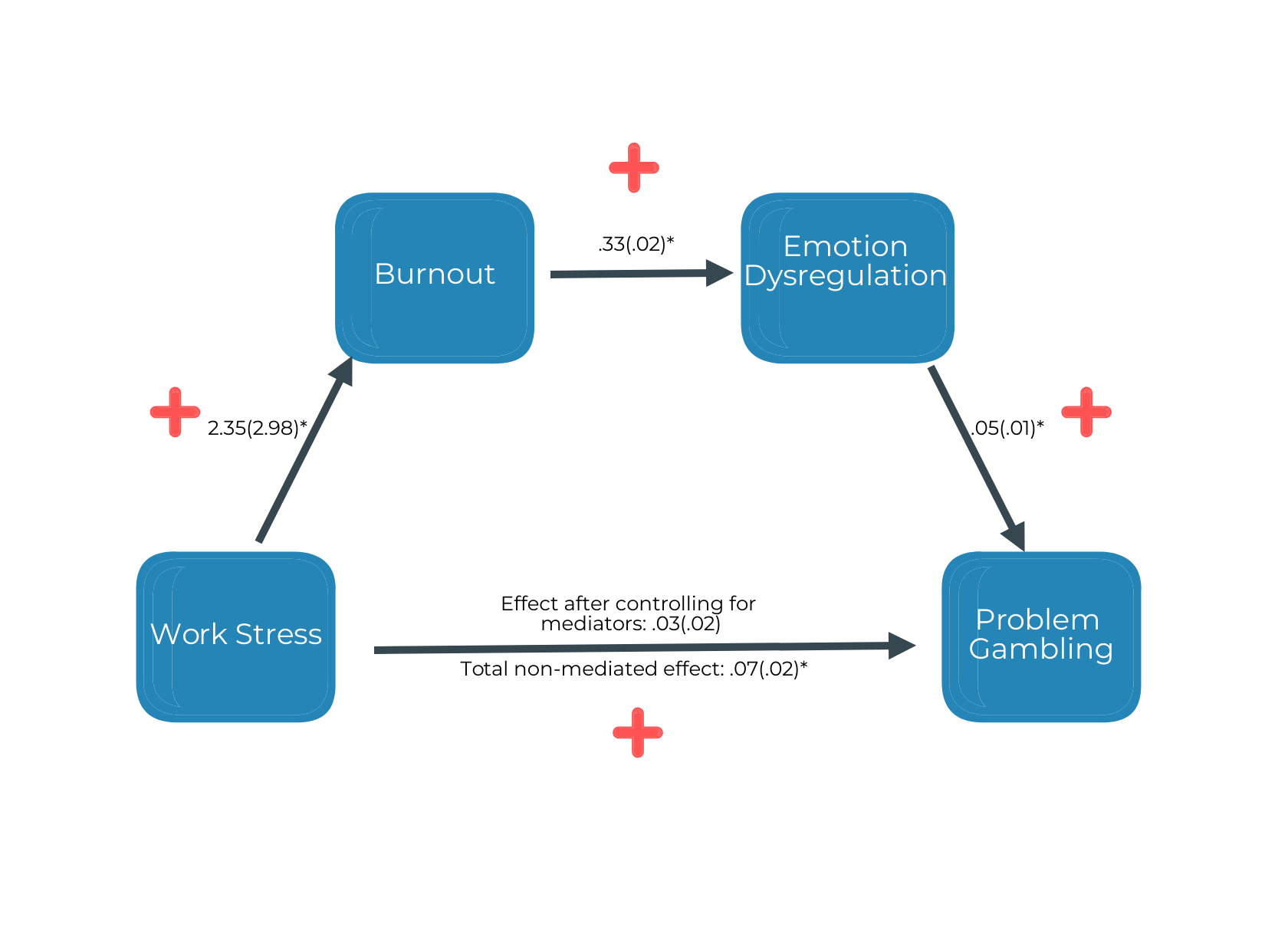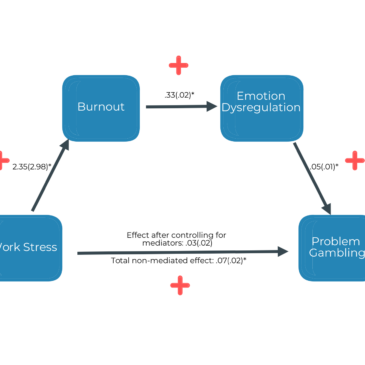According to the American Institute of Stress, work stress is the most significant source of stress in America. Prolonged work stress can have many negative impacts on health, such as an increased risk for heart attacks, hypertension, and addictive behaviors. Work stress can also lead to burnout, which is an enduring state of mental exhaustion and negative attitudes towards work. This week, The WAGER reviews a study by Catherine So-kum Tang and her colleagues that examined how two psychological factors, burnout at work and emotion dysregulation (i.e., difficulty in regulating one’s emotions), might impact the relationship between work stress and problem gambling.
What was the research question?
What role do burnout at work and emotion dysregulation play in the associations between work stress and problem gambling?
What did the researchers do?
Tang and her colleagues analyzed data from online surveys that were completed by 1,233 full-time salaried employees in the United States1. Participants responded to a variety of validated measures that assessed their work stress2, burnout3, emotion regulation4 and problem gambling5. Tang et al. hypothesized that the relationship between work stress and problem gambling would be mediated by burnout and emotion dysregulation–in other words, that people with high work stress would be more likely to experience problem gambling because they felt burnout and had trouble regulating their distress. They used a mediation analysis to test their model and measured the significance of the mediators using bootstrapping.
What did they find?
As the researchers predicted, respondents’ work stress played a significant role in their problem gambling. However, once the researchers controlled for burnout and emotion dysregulation, the relationship between work stress and problem gambling was no longer statistically significant. Together these findings support the proposed model about the mediating role of burnout and emotion dysregulation (see Figure).

Figure. Proposed mediation model to explain the relationship between work stress, burnout, emotion dysregulation and problem gambling. Adapted from Tang et al. (2019) Values shown in the figure are coefficients (and standard errors in parentheses) for each path. * Indicates statistically significant coefficients. Plus signs indicate positive correlations. Click image to enlarge.
Why do these findings matter?
These findings have implications for any employee who is experiencing stress at work. It is important that individuals are able to recognize when the demands of their job are impacting their well being so that they can find other ways to manage their stress and regulate their emotions before they turn to gambling. Mindfulness is an efficient and easily accessible method that employees can use to help reduce work stress and perceived emotional demands at work. Even using a meditation app just once a day for eight weeks to do a guided meditation can decrease employees’ stress levels and increase their well being and perceived social support at work. Using mindfulness and other stress-reducing strategies can help prevent employees from burning out at work which in turn reduces their risk of problem gambling.
Every study has limitations. What are the limitations of this study?
Due to the fact that researchers recruited this sample through an online crowd-sourcing website, the sample might not be representative of the United States working population. The sample might be over-representing individuals with high education, high technological capabilities and low stress employees who had time to complete the survey. Another limitation is that researchers did not look at any of the subscales of any measures, meaning that different aspects of work stress, burnout, and emotion dysregulation might impact problem gambling in different ways that were not revealed in the present study.
For more information:
If you are having trouble coping with work stress, visit the APA’s Help Center for coping strategies. Do you think you or someone you know has a gambling problem? Visit the National Council on Problem Gambling for screening tools and resources. For additional resources, including gambling and self-help tools, please feel free to visit The BASIS Addiction Resources page.
What do you think? Please use the comment link below to provide feedback on this article.
________________
— Alessandra Grossman
1. The researchers used Amazon Mechanical Turk, a crowd-sourcing website to recruit survey participants.
2. Work Stress was measured using the psychological demand and control subscales of the Demand-Control-Support Questionnaire (DCSQ: Sanne et al. 2005)
3. Burnout at work was measured using the Maslach Burnout Inventory-General Survey (MBI-GS: Schaufeli et al. 1996)
4. Emotion regulation was measured using the Difficulties in Emotion Regulation Scale Short Form (DERS-SF: Kaufman et al. 2016)
5. Problem gambling was measured using the Problem Gambling Severity Index (PGSI: Ferris and Wyne, 2001)




